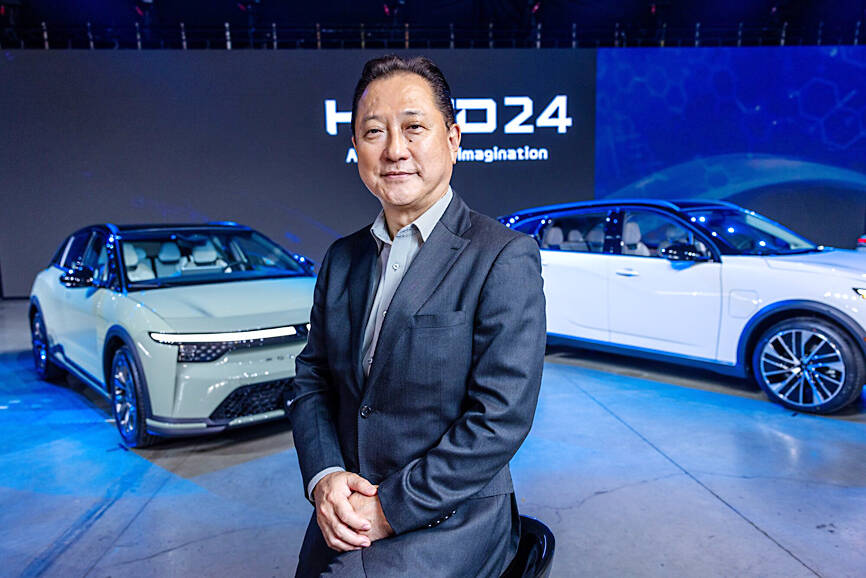Hon Hai Precision Industry Co (鴻海精密), the iPhone maker known as Foxconn Technology Group (富士康科技集團) internationally, is in talks with Nissan Motor Co’s biggest shareholder Renault SA about its willingness to sell its shares in the Japanese automaker, the Central News Agency (CNA) said, citing people it did not identify.
Nissan and fellow Japanese automaker, Honda Motor Co, are exploring a merger that would create a rival to Toyota Motor Corp in Japan and better position the combined company to face competitive challenges around the world, people familiar with the matter said on Wednesday.
However, one potential spanner in the works is Foxconn, which separately is said to have approached Nissan about acquiring a stake.

Photo: Annabelle Chih, Bloomberg
Foxconn has been investing heavily in factories to build electric vehicles (EV) and Nissan, which has slashed its earnings forecasts and is culling 9,000 jobs globally, needs a financial rescue.
CNA said that Jun Seki, chief strategy officer for Hon Hai’s EV arm, told Nissan about Foxconn’s interest in buying its shares, but Nissan did not respond in a favorable manner.
As a result, Seki has started to engage Nissan’s 36 percent shareholder, Renault.
Seki and his team are currently in talks with Renault in France, the report said.
Renault’s stake in Nissan is a holdover from a longstanding alliance between the French automaker, Nissan and Mitsubishi Motors Corp.
Meanwhile, Honda has threatened to end its strategic software partnership with Nissan if it looks to join hands with Foxconn, Nikkei said in an earlier report.
Should the approach from Foxconn turn hostile after a rebuff, Honda also offered to protect Nissan as a white knight investor, Nikkei said.
Official talks, including about a possible merger, between the two Japanese companies might start as soon as Monday, Nikkei added.
Honda’s shares fell more than 2.5 percent in early trading yesterday, while Nissan’s stock was trading down 6.5 percent after jumping a record 24 percent on Wednesday.
Honda is weighing several options, which include a merger, a capital tie-up and even the formation of a holding company, Honda executive vice president Shinji Aoyama said.
The alliance could also include Mitsubishi Motors, he added.
Representatives for Honda and Nissan did not immediately reply to a requests for comment regarding the start date for talks.
A merger of the Japanese car brands would create a bulwark against the Toyota group at home, and allow Honda and Nissan to pool resources to compete with Tesla Inc and Chinese automakers such as BYD Co in global markets.
“It’s only natural for the consolidation of major carmakers to become more common as the industry undergoes a shift toward vehicles with sophisticated technology,” Subaru Corp chief executive officer Atsushi Osaki said during a group interview in Tokyo on Wednesday.
“We need to join hands to take on challenges too difficult to overcome alone,” he added.
Renault has indicated it is open to the idea of a merger between Honda and Nissan, people familiar with the situation said.
Its approval would be key to any deal.

SEEKING CLARITY: Washington should not adopt measures that create uncertainties for ‘existing semiconductor investments,’ TSMC said referring to its US$165 billion in the US Taiwan Semiconductor Manufacturing Co (TSMC, 台積電) told the US that any future tariffs on Taiwanese semiconductors could reduce demand for chips and derail its pledge to increase its investment in Arizona. “New import restrictions could jeopardize current US leadership in the competitive technology industry and create uncertainties for many committed semiconductor capital projects in the US, including TSMC Arizona’s significant investment plan in Phoenix,” the chipmaker wrote in a letter to the US Department of Commerce. TSMC issued the warning in response to a solicitation for comments by the department on a possible tariff on semiconductor imports by US President Donald Trump’s

The government has launched a three-pronged strategy to attract local and international talent, aiming to position Taiwan as a new global hub following Nvidia Corp’s announcement that it has chosen Taipei as the site of its Taiwan headquarters. Nvidia cofounder and CEO Jensen Huang (黃仁勳) on Monday last week announced during his keynote speech at the Computex trade show in Taipei that the Nvidia Constellation, the company’s planned Taiwan headquarters, would be located in the Beitou-Shilin Technology Park (北投士林科技園區) in Taipei. Huang’s decision to establish a base in Taiwan is “primarily due to Taiwan’s talent pool and its strength in the semiconductor

An earnings report from semiconductor giant and artificial intelligence (AI) bellwether Nvidia Corp takes center stage for Wall Street this week, as stocks hit a speed bump of worries over US federal deficits driving up Treasury yields. US equities pulled back last week after a torrid rally, as investors turned their attention to tax and spending legislation poised to swell the US government’s US$36 trillion in debt. Long-dated US Treasury yields rose amid the fiscal worries, with the 30-year yield topping 5 percent and hitting its highest level since late 2023. Stocks were dealt another blow on Friday when US President Donald

UNCERTAINTY: Investors remain worried that trade negotiations with Washington could go poorly, given Trump’s inconsistency on tariffs in his second term, experts said The consumer confidence index this month fell for a ninth consecutive month to its lowest level in 13 months, as global trade uncertainties and tariff risks cloud Taiwan’s economic outlook, a survey released yesterday by National Central University found. The biggest decline came from the timing for stock investments, which plunged 11.82 points to 26.82, underscoring bleak investor confidence, it said. “Although the TAIEX reclaimed the 21,000-point mark after the US and China agreed to bury the hatchet for 90 days, investors remain worried that the situation would turn sour later,” said Dachrahn Wu (吳大任), director of the university’s Research Center for